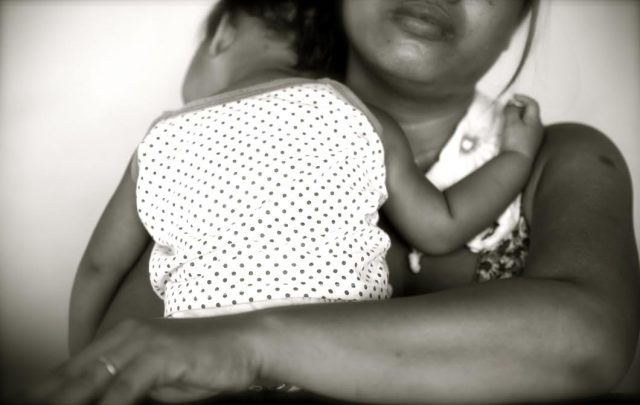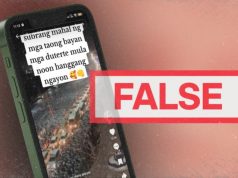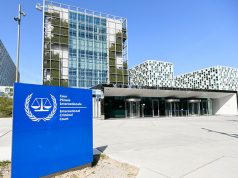This is part of a series of stories on some – in truth, but a handful – of the families left behind by the thousands of victims of the extrajudicial killings that have marked the war on drugs waged by the government, which also turned one year old with the presidency of Rodrigo Duterte.
‘Umuwi (‘yung anak ko) sa bahay, titignan daw niya si tito niya … baka raw tulog lang siya.’
The baby suckles on her mother’s breast. Exhausted from crawling on the floor, her palms and knees dirtied, she has fallen asleep. Her mother watches her, pushing hair away from her face.
“Nangyari po ‘yun, October 5 (It happened on October 5),” Ina*, 29, says, recalling the day that her husband Joshua*, 38, was killed. He left behind their then one-month-old baby and six other children, aged 13 to four, whom the couple had from previous relationships.
Joshua had been at his aunt’s house at the time, and Ina had asked him to return home. It was about 7:00 a.m., and he promised that he would return to their home in Brgy. Payatas, Quezon City, before lunch.
Before noon, Ina received a call and was told that there had been people killed in the area where her husband was.
“Hindi pa po sinasabi sa akin na patay na ‘yung asawa ko kasi ayaw nga po nilang mabigla ako kasi one month pa lang ‘to (They hadn’t told me yet that my husband was dead because they didn’t want to upset me, especially since the baby was just a month old),” Ina says.
She left the baby at home to head to the scene of the crime, but didn’t attempt to go near.
“Parang hindi ko po kaya (I didn’t think I could bear it),” Ina says.
So she went back home to be with her baby and waited for the news.
“Gabi ko na po na-conclude talaga na wala na siya kasi may tumawag sa akin, mga kahipagan ko, tinatanong na kung anong punerarya (It was already night-time when I concluded that he really was gone because someone called, my in-laws, asking about the funeral home),” Ina says.
The police did it, she was told.
Her husband had been among the 100 people rounded up. His mother, father, and sibling had landed in jail for supposedly being “protectors” of Joshua, who had been labeled a “notorious” drug pusher.
“Aminado naman po ako, pero hindi po dapat patayin, eh. Sana pinagbago na lang. Sinabi po nila na notorious daw po na tulak ‘yung asawa ko. Hindi po. Kasi ‘yung notorious na tulak ay ‘yung talagang big time. Sa kanya po, pang-bigas-bigas lang po ‘yun (I admit it, but he still shouldn’t have been killed. He should’ve been persuaded to reform. And they said that my husband was a notorious pusher. That’s wrong. Because notorious pushers are the ones who are really big time. He just does it so he can buy rice),” Ina explains.
She says her husband would buy drugs and sell them after, “Para makaraos lang pang-araw-araw, para sa bigas (Just so we could make it from one day to the next, so we can buy rice).”
She hadn’t been able to go to the morgue to identify her husband’s corpse, so her sister-in-law took care of it. Ina stayed at home to wait for Joshua’s body.
There were stitches on his forehead, she recalls.
“Para sa akin, ‘yung asawa ko, hindi po siya masamang tao. Kasi (inalagaan) niya ‘yung mga anak ko kahit hindi naman kanya ‘yun (For me, my husband is not a bad person. Because he took care of my kids even if they aren’t his),” Ina insists.
Only the older ones comprehended.
“Umiyak nga po ako nung isang… siguro months na namatay ‘yung asawa ko. Umuwi (‘yung anak ko) sa bahay, titignan daw niya si ‘tito’ niya sa bahay… baka raw tulog lang ‘yung Tito niya sa bahay (I was actually crying once… maybe that was months after my husband had died. My son returned home, saying he would see if his ‘uncle’ was at home… that maybe his uncle had just been sleeping at home),” Ina says.
“Hindi masama ‘yung asawa ko. Kung hindi, hindi siya hahanapin ng mga anak ko (My husband is not a bad person. Or else, my children would not be looking for him).”
She plans to tell their youngest about what happened to Joshua when she can already comprehend it.
“Pag ginaganun ko nga, ‘Wa Papa, tsugi!’ (When I tell her, ‘Papa’s not here because he’s dead’),” Ina says, making a cutting motion across her neck, “tawa pa siya nang tawa eh (she even laughs and laughs).”
She wishes her in-laws get out of jail soon so she can get help with the kids. Like Joshua, Ina used to work at a junk shop, segregating trash and picking out what they could turn into cash. But she stopped when she got pregnant, and her three siblings tell her not to work yet, especially as she is still breastfeeding.
She doubts she can even land a decent job, because she did not finish schooling. If she finds work, it probably won’t pay the minimum wage.
She can at least take comfort in the support she gets from her fellow widows in Payatas, who join Church gatherings twice a month. They attend Mass and pray for their husbands’ souls, and share a meal with each other.
“Kahit papaano po nakakagaan ng loob (It lifts the spirits somehow),” Ina says. “Pansamantala po. Pero pag-uwi sa bahay, ganun pa rin. Siyempre masakit pa rin (But it’s only temporary. When we get home, it’s still the same. It still hurts).”
On the first year of the administration of President Rodrigo Duterte, she asks that the killings stop.
“Hindi naman po ako against na i-ano niya ‘yung war on drugs na ‘yun, pero sana po i-avoid na ‘yung pagpapatay (It’s not that I’m against him pursuing the war on drugs, but I wish they would avoid killing),” Ina says. “Sila po kasi ngayon, kung gusto nilang buhayin, pwede naman po sa paa eh. ‘Di ba po? Kung gusto nilang mahuli, paa lang po ‘yung titirahin nila. Hindi po sa ulo, sa dibdib… Hindi po, kasi gusto nilang patayin, uuluhin nila eh (Because if they want to keep the person alive, they can shoot him in the foot. Right? If they want to capture the person, they’d just shoot the foot. Not the head, not the chest. But it doesn’t happen that way. Because they want to kill, and they aim for the head).”
*Names have been changed to protect the people’s identity.










